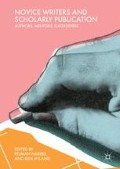Abstract
This chapter explores the nexus of two current approaches possibly informing multilingual novice writers learning the language to write for publication. Reviewing strengths and weaknesses of the linguistic approach and the genre approach, the chapter discusses how both might lead to the writer perception of linguistic disadvantage. Highlighting a hidden yet shared view of language in the two approaches, i.e., viewing language as both analytical and holistic, it is proposed that the genre approach incorporate holistic methods of language acquisition to help writers achieve a fluent and idiomatic control of language, thereby overcoming its last mile problem. Drawing on a case study of a linguist learning to write for publication, the chapter illustrates how memorization strategy ultimately facilitates his academic genre acquisition and complexities involved.
Access this chapter
Tax calculation will be finalised at checkout
Purchases are for personal use only
References
Braine, J. (2005). The challenge of academic publishing: A Hong Kong perspective. TESOL Quarterly,39(4), 707–716.
Casanave, C. P., & Li, X. (2008). Learning the literacy practices of graduate schools: Insiders’ reflections on academic enculturation. Ann Arbor: The University Michigan Press.
Chang, Y.-J., & Kanno, Y. (2010). NNES doctoral students in English-speaking academe: The nexus between language and discipline. Applied Linguistics,31(5), 671–692.
Cho, S. (2004). Challenges of entering discourse communities through publishing in English: Perspectives of nonnative-speaking doctoral students in the United States of America. Journal of Language, Identity, and Education,3(1), 47–72.
Cumming, A. (1989). Metalinguistic and ideational thinking in second language composing. Written Communication,7, 482–511.
Devitt, A. J. (2004). Writing genres. Carbondale: South Illinois University Press.
Ding, Y. (2004). Learning English text by heart in a Chinese university. Xi’an: Shanxi Normal University Press.
Englander, K. (2006). Revision of scientific manuscripts by non-native-English-speaking scientists in response to journal editors’ language critiques. Journal of Applied Linguistics,3, 129–161.
Fillmore, C. J. (1979). On fluency. In C. J. Fillmore, D. Kempler, & W. S.-Y. Wang (Eds.), Individual differences in language ability and language behaviour (pp. 85–101). New York: Academic Press.
Firth, A., & Wagner, J. (2007). Second/foreign language learning as a social accomplishment: Elaborations on a reconceptualised SLA. The Modern Language Journal,91, 800–819.
Flowerdew, J. (1999). Problems in writing for scholarly publication in English: The case of Hong Kong. Journal of Second Language Writing,8(3), 243–264.
Hirvela, A., & Belcher, D. (2001). Coming back to voice: The multiple voices and identities of mature multilingual writers. Journal of Second Language Writing,10, 83–106.
Hyland, K. (2000). Hedges, boosters and lexical invisibility: Noticing modifiers in academic texts. Language Awareness,9(4), 179–197.
Hyland, K. (2003a). Second language writing. Cambridge: Cambridge University Press.
Hyland, K. (2003b). Genre-based pedagogies: A social response to process. Journal of Second Language Writing,12, 17–29.
Hyland, K. (2004). Disciplinary discourses: Social interactions in academic writing. Ann Arbor: The University of Michigan Press.
Hyland, K. (2016). Academic publishing and the myth of linguistic injustice. Journal of Second Language Writing,31, 58–69.
Jiang, N., & Nekrasova, T. M. (2007). The processing of formulaic sequences by second language speakers. The Modern Language Journal,91, 433–445.
Johns, A. (2008). Genre awareness for the novice academic student: An ongoing quest. Language Teaching,41(2), 237–252.
Larsen-Freeman, D. (2007). Reflecting on the cognitive-social debate in second language acquisition. The Modern Language Journal,91, 773–787.
Li, Y. (2002). Writing for international publication: The perception of Chinese doctoral researchers. Asian Journal of English Language Teaching,12, 179–193.
Li, J., & Schmitt, N. (2009). The acquisition of lexical phrases in academic writing: A longitudinal case study. Journal of Second Language Writing,18, 85–102.
Nemser, W. (1971). Approximate systems of foreign language learners. International Review of Applied Linguistics,9, 115–124.
Pawley, A., & Syder, F. H. (1983). Two puzzles for linguistic theory: Nativelike selection and nativelike fluency. In J. C. Richards & R. W. Schmitt (Eds.), Language and communication. London: Longman.
Pennycook, A. (1996). Borrowing others’ words: Text, ownership, memory, and plagiarism. TESOL Quarterly,30, 201–230.
Rose, D., & Martin, J. R. (2012). Learning to write, reading to learn: Genre, knowledge and pedagogy in the Sydney school. Bristol, CT: Equinox.
Sasaki, M., & Hirose, K. (1996). Explanatory variables for EFL students’ expository writing. Language Learning,46(1), 137–174.
Selinker, L. (1972). Interlanguage. International Review of Applied Linguistics,10, 209–231.
Shapiro, S., Cox, M., Shuck, G., & Simnitt, E. (2016). Teaching for agency: From appreciating linguistic diversity to empowering student writers. Composition Studies,44, 31–52.
Sinclair, J. M. (1991). Corpus, concordance, collocation. Oxford: Oxford University Press.
Skehan, P. (1998). A cognitive approach to language learning. Oxford: Oxford University Press.
Swales, J. (1990). Genre analysis: English in academic and research settings. Cambridge: Cambridge University Press.
Swales, J., & Feak, C. B. (2000). English in today’s research world. Ann Arbor: University of Michigan Press.
Tardy, C. M. (2016). Beyond convention: Genre innovation in academic writing. Ann Arbor: University of Michigan Press.
Uzuner, S. (2008). Multilingual scholars’ participation in core/global academic communities: A literature review. Journal of English for Academic Purposes,7, 250–263.
Widdowson, H. (1989). Knowledge of language and ability for use. Applied Linguistics,10, 128–137.
Author information
Authors and Affiliations
Corresponding author
Editor information
Editors and Affiliations
Rights and permissions
Copyright information
© 2019 The Author(s)
About this chapter
Cite this chapter
Xu, F. (2019). Learning the Language to Write for Publication: The Nexus Between the Linguistic Approach and the Genre Approach. In: Habibie, P., Hyland, K. (eds) Novice Writers and Scholarly Publication. Palgrave Macmillan, Cham. https://doi.org/10.1007/978-3-319-95333-5_7
Download citation
DOI: https://doi.org/10.1007/978-3-319-95333-5_7
Published:
Publisher Name: Palgrave Macmillan, Cham
Print ISBN: 978-3-319-95332-8
Online ISBN: 978-3-319-95333-5
eBook Packages: Social SciencesSocial Sciences (R0)

